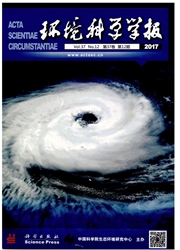

 中文摘要:
中文摘要:
电子废物是固体废物环境管理的热点问题,而废线路板是电子废物的研究核心.废线路板是由铜箔、树脂和增强材料层压而成的复合材料,以破碎和分选过程相组合的机械物理方法是其资源化回收处理的主流技术,就如何提高破碎效果已成为机械物理技术发展面临的难题.研究提出了加热改性预处理的技术方法,用于废线路板结构物理改性和微观破坏,以提高破碎解离效率,其可实现金属与非金属的高度解离.基于改性处理技术,本文还分别从微观和宏观破坏力学角度,探究了加热改性处理机制.同时,结合ANSYS有限元热应力模型,对改性作用进行了理论分析.
 英文摘要:
英文摘要:
Electronic waste (e-waste) is a main topic for solid waste management. Waste printed circuit board (PCB) represents one of the significant and challenging fractions of e-waste stream. The laminated PCB consists of organic materials, metal, and glass-fiber. Mechanical treatment technique, which employs crushing and separation processes for PCBs recovery, is becoming popular in industrial practice. However, the improvement of crushing efficiency has been considered the bottleneck faced by most recyclers. Consequently, a thermal shock method was firstly designed to pretreat waste PCBs for the physical change and microstructure-ievel breakage of whole hoard, aiming at improving crushing performance, specifically on the complete liberation of metal and non-metallic materials. The thermal-shocked mechanism leading to the physical changes of PCBs has been studied from the micro- mechanical properties and macro-mechanical response. Meanwhile, combined with the ANSYS finite element model for temperature/stress field evolution, the theoretical analysis is simulated to assess the effect of thermal-shocked treatment.
 同期刊论文项目
同期刊论文项目
 同项目期刊论文
同项目期刊论文
 期刊信息
期刊信息
